The US stock market has been experiencing turbulence recently, especially in the tech sector. On a recent Wednesday, major stock indices such as the Dow Jones Industrial Average, S&P 500, and Nasdaq Composite saw declines, with tech-heavy Nasdaq leading the losses. Notable tech companies like Palantir, Nvidia, and Broadcom recorded significant drops in their stock prices.
Investors have been concerned about the tech-led selloff, prompting a rotation out of riskier assets into safer investments. The recent market movements have been tied to uncertainties surrounding the sustainability of the artificial intelligence cAIc boom.
Retail earnings have also been a focal point for investors, with companies like Target facing challenges due to pressures from tariffs and a constrained consumer base. Despite a profit beat, Target's shares plummeted by 10%, adding pressure on the newly appointed CEO, Michael Fiddelke.
The Federal Reserve's minutes from its prior meeting in July and the upcoming speech by Fed Chair Jerome Powell at the Jackson Hole symposium carry substantial weight. Investors are eager for insights into the central bank's stance on future interest rate cuts, given the conflicting economic data highlighting a weakening labor market and persistent inflation concerns.
President Trump's recent call for Federal Reserve Governor Lisa Cook to resign has added to the apprehension surrounding the central bank's policy decisions. The political pressure on the Fed comes amidst broader market uncertainties.
In the corporate sphere, companies such as Lowe's, Estée Lauder, Baidu, and Hertz have made headlines with their earnings reports and strategic moves. Hertz's collaboration with Amazon to sell pre-owned vehicles has attracted attention and driven a surge in its stock price.
Meanwhile, the tech sector continues to face challenges, with Palantir stock experiencing a notable decline after reaching an all-time high. Factors contributing to this decline include investor rotation out of large-cap tech stocks and a negative report from a short seller.
Target's recent leadership transition, with Michael Fiddelke taking over as CEO, comes at a critical juncture for the retailer facing shifting consumer demands and economic uncertainties. The market reaction to the appointment reflects the need for strategic clarity and operational effectiveness.
Looking ahead, all eyes are on the Jackson Hole Economic Symposium, where Powell's speech is anticipated to provide crucial insights into the Federal Reserve's approach towards economic data analysis and potential policy adjustments. As global economic conditions evolve, policymakers and investors alike are closely monitoring developments at this high-profile event.
The annual symposium, known for shaping economic narratives and policy decisions, will host key figures from central banks worldwide. Powell's remarks are expected to address pressing issues such as inflation, labor market dynamics, and the central bank's policy framework.
With ongoing concerns about inflation, labor market weakness, and uncertainty surrounding the Fed's policy trajectory, Powell's speech at the Jackson Hole symposium holds significant implications for financial markets and economic outlooks. As investors brace for potential interest rate adjustments and policy shifts, Powell's communication will play a crucial role in guiding market expectations and decision-making processes.


